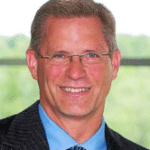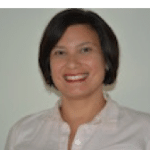A Committee Review of AI Integration in Education
At the AACTE 2024 Annual Meeting in February, incoming AACTE Committee on Innovation and Technology members Peña Bedesem (Kent State University) and Jon Margerum-Leys (Oakland University) attended the Featured session “AI Integration in Education: Bridging the Gap for Future Educators.” In the following article, they recap the panelists’ presentation.
AACTE at its best has always brought together viewpoints representing philosophy, innovation, and implementation. The featured panel on artificial intelligence (AI) integration certainly did that. Moderator David Slykhuis, Ph.D., (Valdosta State University) led a wide-ranging conversation among Arizona State’s Punya Mishra, Ph.D., Marie Heath, Ed.D., (Loyola Marymount); and Diane Lauer, Ed.D., Chief Academic Officer of St. Vrain Valley Schools in Colorado.
While all three panelists brought expertise regarding artificial intelligence, each offered a unique perspective. Mishra served as the proponent of innovation, Lauer the experienced implementer, and Heath the philosophical conscience of the group.
A persistent thread in the presentation was the necessity of considering ethical and societal issues. Some questions and thoughts the panelists encouraged attendees to consider included:
- What are the embedded politics of AI?
- The vast majority of text used to “feed” generative AI systems is in English, much of it specifically American English. We therefore have a technology that speaks in a language and has a memory that is for the most part English-centric.
- Related, there are systemic biases, injustices, and prejudices reflected in the text and other knowledge generated by our society. Does AI therefore have biases for seeing the world through the underlying biases represented in these texts?
- What does it mean, particularly for PK-12 students, to interact with a machine as if it is human, and in some sense instead of interacting with other students?
Generative AI’s ability to help students cheat was an early major concern in the field and in society at large, but for the most part, the field has moved past this issue. Lauer cited the importance of “leaning into metacognition” and advising students to “never surrender to the bot,” meaning to resist the temptation to allow AI to dominate their academic preparation by doing things like completing assignments with no oversight.
From the Industrial Revolution forward, a parade of technologies (radio, television, the World Wide Web) have been touted as replacements for teachers. Will AI replace teachers? The panel addressed this question by observing that PK-12 education takes place in the context of society. It is clear that AI is already having societal impacts, and it seems inevitable that those impacts will broaden and deepen in the coming years. In turn, education will change. The work of teachers will be different, as has been the case when considering the impact of previous technologies. The panelists recommend a continuing shift in the educational narrative to stress the importance of teaching, even as the role of teachers continues to evolve. Importantly, the role of the teacher could evolve to include teaching students how to be “human” as it is likely that students will increase their interactions with AI as the technology becomes more prevalent in education and society as a whole.
We are in some ways on the ground floor of what may become the largest revolution in human history. Lauer, who has provided professional development to dozens of teachers, cares “about what kids can do and create.” Mishra, who sees AI as “the ongoing project of my life now,” observed that “we are limited by our imagination. . . we have not scratched the surface. Heath concurred: “The future is not written. We can dream it and we can work toward the future we want.”
AACTE and the AACTE Committee on Innovation and Technology have produced several webinars on AI and other technological applications. We invite you to visit one or more of the following professional development opportunities listed.
- Designing a Syllabus Using Generative AI
- Lesson Planning: Generative AI Tools for Teachers and Teacher Educators
- More Lesson Planning: Generative AI Tools for Teachers and Teacher Educators
- Leveraging Technology and Digital Advances to Develop Global Competencies in Teacher Educators and Candidates
- AACTE’s Innovation & Technology Committee Presents: An Introduction to Using AI Tools in Education Preparation Programs
- Leveraging AI for Rubric Design
 Jon Margerum-Leys, Ph.D. is dean of Oakland University’s School of Education and Human Services. He is also a member of the AACTE Committee on Innovation and Technology. Margerum-Leys can be reached at jmargerumleys@oakland.edu.
Jon Margerum-Leys, Ph.D. is dean of Oakland University’s School of Education and Human Services. He is also a member of the AACTE Committee on Innovation and Technology. Margerum-Leys can be reached at jmargerumleys@oakland.edu.
 Peña L. Bedesem, Ph.D. is an associate professor & co-coordinator of the Special Education Program at Kent State University. She is also a Holmes program coordinator and a member of the AACTE Committee on Innovation and Technology. Bedesem can be reached at pbedesem@kent.edu
Peña L. Bedesem, Ph.D. is an associate professor & co-coordinator of the Special Education Program at Kent State University. She is also a Holmes program coordinator and a member of the AACTE Committee on Innovation and Technology. Bedesem can be reached at pbedesem@kent.edu
Tags: Annual Meeting, technology






